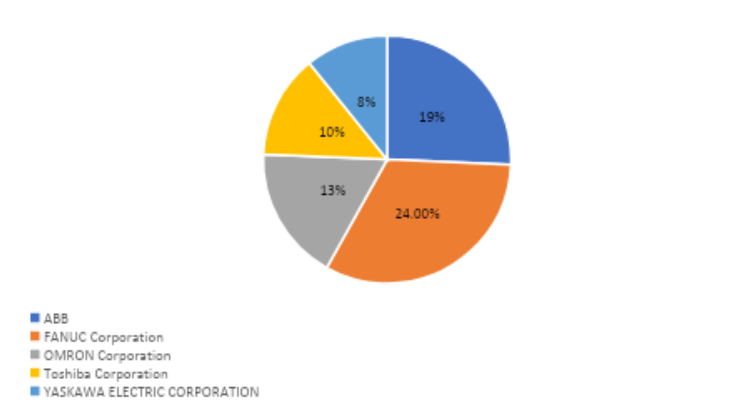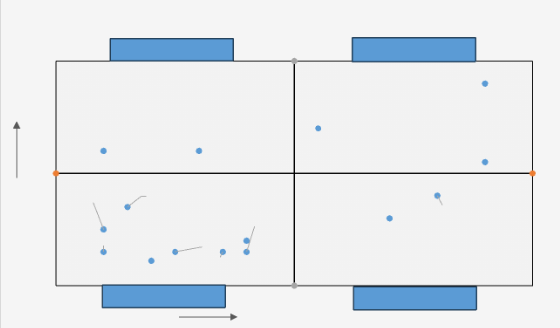Introduction of Articulated Robot Market/Industry:
The market for Articulated Robot is being propelled by the due to growing advancements in automation and robotics technology. According to Cognitive Market Research, it is valued at USD 25142.2 million in 2023; the market is projected to grow at a CAGR of 5.20%, reaching USD 88285.66 million by 2032. The articulated robotic marketplace is experiencing extensive growth, driven by improvements in automation and robotics generation throughout diverse industries. Articulated robots, characterized by the aid of their bendy fingers and a couple of joints, are designed to perform complex obligations with precision and flexibility. These robots are broadly utilized in production, assembly, welding, painting, and material coping with, improving efficiency and decreasing labor prices. The increasing call for automation in sectors which include automotive, electronics, and patron goods is fueling the adoption of articulated robots. Their potential to handle repetitive obligations, enhance product quality, and make sure employee protection makes them priceless in contemporary production environments. Moreover, the upward thrust of Industry 4.0, which emphasizes interconnected and smart manufacturing systems, is similarly propelling the market. Key players in the articulated robot marketplace are always innovating and specialize in enhancing robot capabilities, ease of programming, and integration with advanced technologies like synthetic intelligence and machine studying. As industries try for more productiveness and flexibility, the articulated robot marketplace is poised for large growth, transforming traditional manufacturing procedures and shaping the destiny of automation.
Top Companies Operating in the Articulated Robot Industry Worldwide (Companies should be mentioned in order of their shareholding)
- ABB (Switzerland)
- FANUC Corporation (Japan)
- OMRON Corporation (Japan)
- Toshiba Corporation (Japan)
- YASKAWA ELECTRIC CORPORATION. (Japan)
- Universal Robots (Denmark)
- Rockwell Automation, Inc. (U.S.)
- Robert Bosch GmbH (Germany)
- Mitsubishi Electric Corporation (Japan)
- Panasonic Corporation (Japan)
- NACHI-FUJIKOSHI CORP. (Japan)
- Seiko Epson Corporation (Japan)
- KUKA AG (Germany)
- DENSO CORPORATION (Japan)
- Aurotek Corporation (Taiwan)
Criteria for Comparing Companies in the Articulated Robot Market:
Cognitive Market Research analyzed numerous companies to provide an accurate assessment of the capabilities and market position of companies in the Articulated Robot market. When evaluating groups within the articulated robot marketplace, numerous key standards must be considered. First, product range and innovation are critical; corporations that offer a diverse choice of articulated robots with various payload capacities, reach, and functionalities have a tendency to guide the marketplace. Technological advancements play a widespread position, mainly in areas inclusive of AI integration, programming ease, and collaborative abilities, which beautify the robots' versatility. Next, market presence and revel can suggest reliability and trustworthiness. Companies with a protracted status history inside the robotics industry may additionally have established track facts and hooked up consumer relationships. Additionally, customer service and carrier quality are crucial; powerful after-income guides, schooling, and renovation services can appreciably affect user pride. Pricing and cost-effectiveness additionally matter, as businesses are searching for answers that offer first-class go-back on funding. Lastly, sustainability practices are more and more vital; companies that prioritize green manufacturing approaches and power-efficient robots may additionally attraction more environmentally aware customers. By comparing these criteria, stakeholders could make knowledgeable choices while selecting agencies inside the articulated robot market.
Top Manufacturing Companies of Articulated Robot:
ABB (Switzerland), FANUC Corporation (Japan), OMRON Corporation (Japan), Toshiba Corporation (Japan), YASKAWA ELECTRIC CORPORATION. (Japan) are the key players in the Articulated Robot Market.
ABB (Switzerland).
ABB is a worldwide leader in electrification and automation technology, running in over one hundred nations with a rich record spanning more than one hundred thirty years. The share of this company for this market is 19%. Headquartered in Zurich, Switzerland, ABB specializes in imparting modern solutions that decorate productiveness, safety, and performance throughout diverse industries, which include utilities, transportation, and production.
FANUC Corporation (Japan):
FANUC Corporation is a main international manufacturer of manufacturing unit automation and robotics, situated in Oshino, Japan. The share of this company for this market is 24%. Established in 1956, FANUC focuses on CNC (laptop numerical manipulation) systems, commercial robots, and factory automation solutions, serving a variety of industries consisting of automobiles, electronics, and consumer items.
OMRON Corporation (Japan),
OMRON Corporation is an outstanding Japanese multinational agency founded in 1933, situated in Kyoto, Japan. Renowned for its contributions to automation and management, OMRON operates across diverse sectors, inclusive of manufacturing, healthcare, and infrastructure. The share of this company for this market is 13%. The organization specializes in developing progressive solutions that beautify productiveness, efficiency, and safety.
Toshiba Corporation (Japan)
Toshiba Corporation, founded in 1875 and centered in Tokyo, Japan, is a varied multinational conglomerate regarded for its innovation in various sectors, inclusive of electronics, power, and infrastructure. The share of this company for this market is 10%. The organization operates across a wide range of industries, imparting advanced technology and answers that cope with the evolving wishes of clients internationally.
Yaskawa Electric Corporation. (Japan)
Yaskawa Electric Corporation, founded in 1915 and centered in Kitakyushu, Japan, is a worldwide chief in automation, robotics, and movement manipulation technology. The share of this company for this market is 8%. Renowned for its progressive answers, Yaskawa focuses on commercial robots, servo drives, and programmable controllers, catering to various industries consisting of cars, electronics, and meal processing.


Potential Threats to Top Five Players in the Articulated Robot Market:
CMR found that emerging players in the Articulated Robot market, such as Universal Robots (Denmark), Rockwell Automation, Inc. (U.S.), Robert Bosch GmbH (Germany), Mitsubishi Electric Corporation (Japan), Panasonic Corporation (Japan) are poised to become significant threats to the top five companies. Emerging gamers within the articulated robotic market, together with Universal Robots, Rockwell Automation, Robert Bosch GmbH, Mitsubishi Electric Corporation, and Panasonic Corporation, are increasingly positioning themselves as formidable competitors to installed enterprise leaders. Universal Robots, based totally in Denmark, is especially recognized for its collaborative robots (cobots), which can be consumer-pleasant and designed for safe interaction with human workers, making automation handy for small and medium organizations. Rockwell Automation, a U.S. Organisation, leverages its information in industrial automation and software solutions to combine robotics seamlessly into clever production environments. Robert Bosch GmbH of Germany, with its widespread experience in engineering and technology, is growing progressive robotic solutions that decorate productivity across various sectors. Mitsubishi Electric and Panasonic, both from Japan, are capitalizing on their strengths in automation and electronics to supply advanced robot technology that targets performance and precision. These organizations are more of the handiest innovating rapidly; however, they additionally adopt aggressive pricing strategies and tailored answers to meet particular enterprise wishes. As they continue to gain market percentage, those rising players threaten to disrupt the dominance of mounted firms, driving in addition innovation and competitiveness inside the articulated robotic marketplace.
Conclusion
Integrating the Internet of Things (IoT) and Industry 4.0 principles to Enhance the Growth of the Articulated Robot Market
The market, valued at USD 25142.2 million in 2023, is projected to reach USD 88285.66 million by 2032, The articulated robotic marketplace is poised for substantial growth, pushed by way of the increasing call for automation throughout numerous industries. As producers are trying to find to decorate performance, precision, and safety, the adoption of advanced robotic solutions is becoming critical. Emerging gamers are capitalizing on this trend by providing innovative technology, mainly in collaborative robots and AI integration. The focus on sustainability and consumer-friendly answers, in addition, underscores the marketplace's evolution. With ongoing advancements and a shift towards smart manufacturing, the articulated robotic marketplace is set to convert conventional manufacturing methods, creating new opportunities for groups and fostering competitiveness within the global landscape. Emerging players in the articulated robotic marketplace, which includes Universal Robots, Rockwell Automation, Robert Bosch GmbH, Mitsubishi Electric, and Panasonic, are positioning themselves as sturdy competitors to established leaders. With revolutionary technology like collaborative robots and advanced automation solutions, those groups are assembling the rising demand for flexibility and performance in production. Their awareness of person-pleasant interfaces, aggressive pricing, and sustainability initiatives complements their appeal, doubtlessly disrupting the dominance of the top 5 firms within the market. Key players within the articulated robot market consist of ABB (Switzerland), FANUC Corporation (Japan), OMRON Corporation (Japan), Toshiba Corporation (Japan), and Yaskawa Electric Corporation (Japan). These corporations are identified for their advanced robotics era, focusing on innovation, efficiency, and automation answers. With good-sized enjoy and a strong international presence, they offer a wide range of articulated robots tailor-made for various applications in the manufacturing, car, and electronics sectors. Their dedication to analysis and improvement drives continuous improvement and competitiveness in the market.
Author's Detail:
Kalyani Raje /
LinkedIn
With a work experience of over 10+ years in the market research and strategy development. I have worked with diverse industries, including FMCG, IT, Telecom, Automotive, Electronics and many others. I also work closely with other departments such as sales, product development, and marketing to understand customer needs and preferences, and develop strategies to meet those needs.
I am committed to staying ahead in the rapidly evolving field of research and analysis. This involves regularly attending conferences, participating in webinars, and pursuing additional certifications to enhance my skill set. I played a crucial role in conducting market research and competitive analysis. I have a proven track record of distilling complex datasets into clear, concise reports that have guided key business initiatives. Collaborating closely with multidisciplinary teams, I contributed to the development of innovative solutions grounded in thorough research and analysis.
